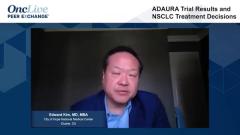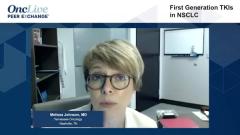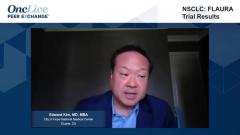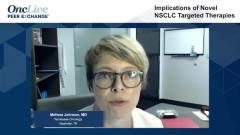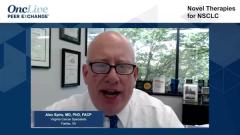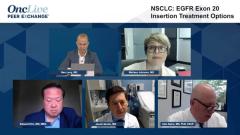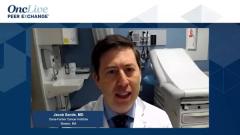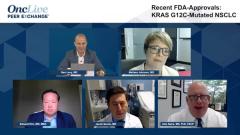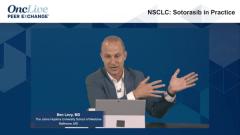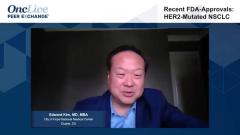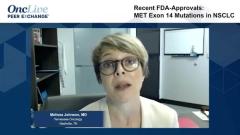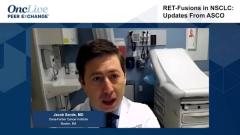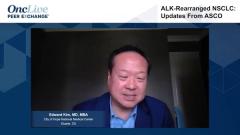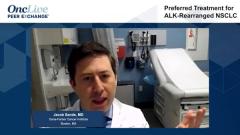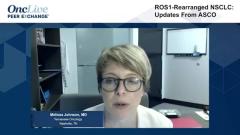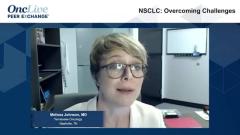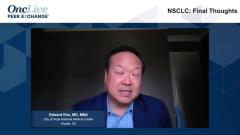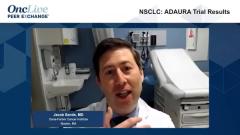
NSCLC: Final Thoughts
The discussion about the evolution of precision medicine in non–small cell lung cancer (NSCLC) ends as each expert discusses their final thoughts.
Episodes in this series

Benjamin Levy, MD:Jacob, I see you nodding your head patiently here. Your thoughts on this, how do we do better?
Jacob Sands, MD: It’s wonderful the data are out there, and what I hope is exactly what Melissa is saying, that it can foster a real discussion about how to improve things rather than just being upset about numbers. What I’ve found from interacting with various community centers is that it really is that dance, that multidisciplinary discussion, where sometimes pathology owns the decision-making, where I’ve had medical oncologists say, “Yes, they’re allowed to order other things. But then they must fill out all the paperwork, figure out where to send it.” They’re kind of on the hook as far as is this going to work out financially. They must then organize all of this.
It’s kind of a false option to say, “Oh no, you can do anything, but you have to then coordinate all of this behind- the-scenes type of stuff that is very difficult in a busy clinic day.” It then has oncologists following within the tracks that were set for them within the pathology departments. But pathology departments are not really patient-facing. They’re not sitting in front of these individuals, and I’ve found in some centers, they don’t fully appreciate how revolutionary these targeted therapies have been. I gave a CME [continuing medical education] talk at a center where afterward, the medical oncologist reached out to me and said, “I had you do this, I had them bring you in because I’ve been having trouble helping my pathology department understand how important this NGS [next-generation sequencing] testing really, is as opposed to one-off tests because they’re looking at costs and such.” It’s a matter of pathologists understanding how amazing these targeted therapies are and seeing these waterfall plots. There is a lot of discussion still there within that multidisciplinary hospital.
Alex Spira, MD, PhD, FACP: All I will say is, and this is even before me, somehow the breast [cancer] community figured this out. Remember there was a day where ER [estrogen receptor], PR [progesterone receptor], and HER2 were completely novel, and that is in my lifetime of being a physician. They figured out how to do this as standard of care, and I know these tests are more expensive and they’re more complicated, but it shouldn’t be. It should be figuring out how to do a reflex [test], and I don’t understand why the lung cancer pathologist community hasn’t been able to figure this out.
Benjamin Levy, MD:Good point, Alex. Jacob, go ahead.
Jacob Sands, MD: We’re at a point now where NGS testing, it’s hard to argue against it, and that’s been the trend over the last 5 years, this discussion of NGS. We have a number now in which NGS seems pretty clear that that should be the testing, and that will solve a lot when that happens more broadly.
Benjamin Levy, MD:Good point. Ed, final parting shot on how we can do better or your thoughts on this? You’re at a high-level position at a big health system. Your strategies?
Edward Kim, MD, MBA: It’s a very challenging aspect. Alex, I’ll applaud you for putting those data out. I hope JCO [Journal of Clinical Oncology] doesn’t reject it when you submit it to them because who knows. But it should be published. It should be out there. Those numbers are very reflective. I know there may be some time bias and history bias, but we think we do better than we do in this. I think there’s a lot of secondary gain out there, everything from the local providers, to the payers, to the hospital systems. There are some groups that own their own equipment. As you said, the pulmonologists want to get through the day and don’t want to make it more complicated. It’s tough. You have to somehow democratize it, and it’s such a changing field with so many players, it’s very difficult.
We have to do our best at this point. We must emphasize that it is getting more complex. I’d love for pathologists to default it, but they don’t have all the equipment in house, and they have to send it out many times, and so that complicates things. And patients don’t want to wait. Ben, you opened the day by saying it took you 2 hours in Epic [electronic medical record system] to order a new drug that you knew about. If you were in the community, there’s no way you would do that again. You would just go forward because your Press Ganey [patient satisfaction] scores would go down after everybody complains about waiting so long, and then you won’t get your bonus.
Benjamin Levy, MD:All good points. I’ll add one last thing and say we can talk about pathologists, and we can talk about tissue. We all have a tough time sometimes finding a good interventional radiologist or pulmonologist to get tissue, but we all know a good phlebotomist. Remember that liquid can play a critical role in adding to detecting these genotypes for all patients.
I want to thank you all for this rich and informative discussion. Before we conclude, I’d like to get final thoughts from each of you. Dr Johnson.
Melissa Johnson, MD: Thanks for letting me go first. You’re absolutely right that if anything bubbles up to the surface after the last 2 hours, it’s the importance of the NGS panel. Do it early, and do it often. The other thing that I’ll take away from ASCO [American Society of Clinical Oncology annual meeting] this year with respect to targeted therapies is that it’s not just TKIs [tyrosine kinase inhibitors] any longer. Antibody-drug conjugates are coming into the clinic in a real way for patients with lung cancer, the way they did for patients with breast cancer a few years ago. Thanks for having me. I had a great time.
Benjamin Levy, MD:Thanks, Melissa. Dr Kim.
Edward Kim, MD, MBA: Yes, this was such a great discussion with all the folks. I want to throw in a plug for eligibility. We’ve discussed a lot of clinical trials here. Alex has been involved with this effort to modernize eligibility. I do believe a lot of these trials are inherently discriminatory, and we are not including the populations that are reflective of who’s being treated. The magnitude of benefit of some of these drugs, it doesn’t matter if you’re a PS2 [performance status of 2], or underserved, or have some baseline cardiac or renal issues. It’s OK, and we shouldn’t exclude. I want to keep emphasizing that we want to make our protocols with less eligibility criteria and more inclusive.
Benjamin Levy, MD:Great point. Dr Spira.
Alex Spira, MD, PhD, FACP: Thanks, Ben. Everybody said everything. I agree completely. I say this when I give my talks, you can’t give a targeted therapy if you don’t test for the targeted therapy. So just test; test early and often, kind of like voting.
Benjamin Levy, MD:Finally, Dr Sands.
Jacob Sands, MD: Ed’s point is so important. One of the most shocking things to me that I learned this year is that the greatest indicator of one’s health outcome is not something like hypertension or a diabetes diagnosis. What zip code they live in is a better indicator of one’s health outcomes than any other health [issue]. Getting these trials to all communities, getting these targeted therapies and testing to all communities, is something that cannot be overstated. It’s so important. Then I’ll highlight that it’s important that everybody look back on all of their patients who were diagnosed a year, 2 years, or even longer ago, and make sure that NGS panel was done at that time, make sure that these patients have been tested. We just can’t miss this. This is life-changing for individuals.
Benjamin Levy, MD:Great parting shot. Thanks again for the panel. This was a vibrant, fun discussion. Thanks to our viewing audience. We hope you found this OncLive® Peer Exchange discussion to be useful and informative.
TRANSCRIPT EDITED FOR CLARITY


